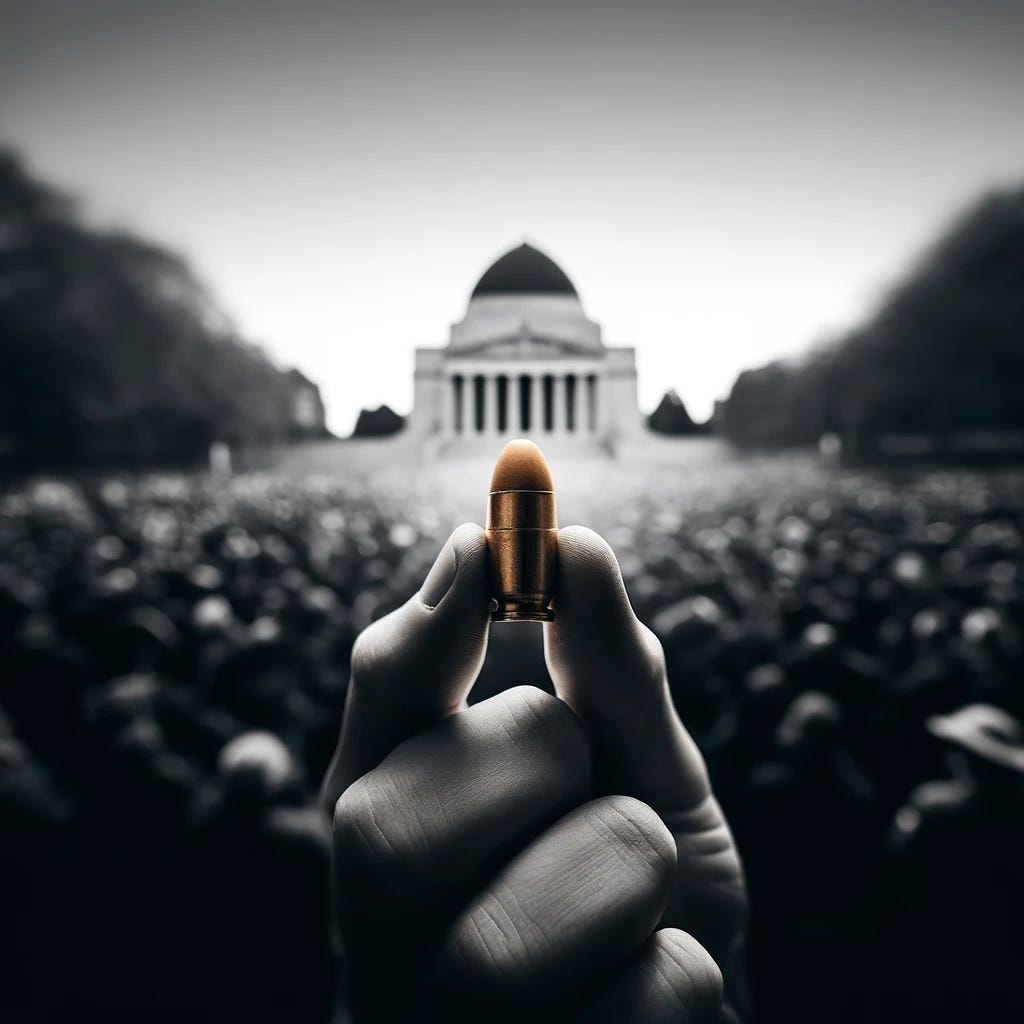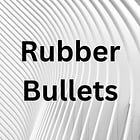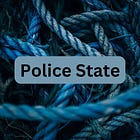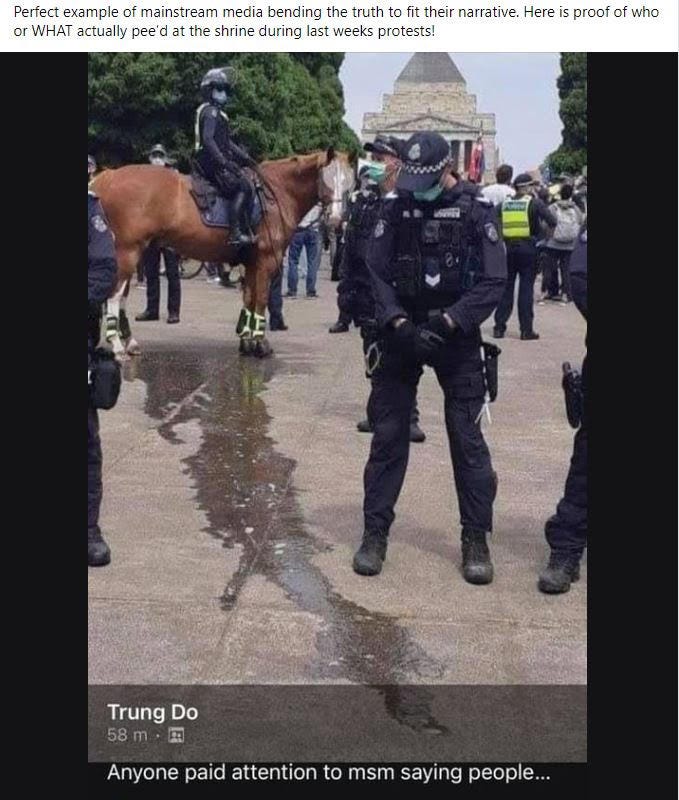Interview with Michael Gray Griffith
On Rubber Bullets, Courage, Suicide, Faith, The Passively Awake and more.
I’m not sure when I first came across Michael Gray Griffith.
One day he was just there.
I think it was a video of him, somewhere in the countryside, by himself, talking to camera about what he was witnessing during his travels across Australia talking to people about their stories.
At that point I had no idea who he was or what his name was, but I felt a connection. He was real, doing something that was true.
Michael is an important Australian, in fact he has historical significance, as he is part of a small, decentralized group of Australians who took it upon themselves to report on what was actually happening in this country, in real time, and about real people.
Without their work, that testimony would have been forever lost.
I’ve written about Australian Police brutality, which is relevant to this interview, you can see some footage here:
Most Australians don’t know what Australian Police did to their fellow citizens.
I’ve been hoping I’d get the opportunity to create this interview with Michael, and being the artist that he is, we’ve ended up with something very special. You can hear him answer my questions in his own voice. It’s raw and intimate.
I could not have asked for more.
With thanks to Michael Gray Griffith, for everything.
Image: Kelli Stevenson
1. Michael, can you please share your journey from playwright to political activist and host of Cafe Locked Out? What key experiences or realizations sparked this transformation?
2. Being shot with a rubber bullet during a protest must have been a shocking experience. How did that moment impact your perspective on the unfolding events and your role in the activism?
3. Despite the challenges faced, you described a profound sense of unity among protesters at the Shrine of Remembrance. What do you think forged this connection, and how did it influence the atmosphere of the protest?
“the horse that pissed at the shrine, the only image of urination”
4. Your interactions with police officers during the protests revealed a complex dynamic. How did these exchanges shape your understanding of their role and the internal conflicts they may have faced?
5. As a father, how has your drive to create a better future for your children influenced your activism and your determination to stand up against perceived tyranny?
6. Some police officers expressed support for your cause during personal conversations. How did these moments of connection impact your view of the relationship between protesters and law enforcement?
7. Your play "Marooned" tackled the sensitive issue of soldier suicide and was used by the army for prevention efforts. What unique challenges and responsibilities come with addressing such profound social issues through art?
8. Cafe Locked Out has amplified the voices of individuals affected by lockdowns. What common themes or insights have emerged from these diverse stories, and how have they shaped your understanding of the pandemic's impact?
9. In "Pick Up Your Tools. All Is Not Lost," you highlight the importance of community in healing and rebuilding. How do you envision this process unfolding, and what are some practical ways individuals can contribute to creating a more connected and resilient society?
10. The incorporation of religious symbols by young protesters has been a striking feature of the demonstrations. What do you think this says about the role of faith in activism and the search for meaning in times of crisis?
11. You've written about the unifying power of a shared sense of purpose, even in the face of a perceived common enemy. How can this energy be harnessed and redirected towards positive change and building a better society?
12. Reflecting on the lockdown protests, what key lessons or insights do you think can be carried forward to inform and inspire future social and political movements?
13. Maintaining resilience and commitment in the face of both support and opposition is a challenge for any activist. What strategies or beliefs have helped you stay true to your convictions and continue your work?
14. For those feeling inspired to take a stand against injustice or fight for their beliefs, what advice would you offer based on your own experiences in activism and community-building?
15. Looking ahead, what are your current focus areas and projects as an activist, playwright, and host of Cafe Locked Out? How can people stay connected with your work and contribute to the causes you champion?
Cafe Locked Out (KULTURE) 8:32 (@cafelockedout) / X
Cafe’s Newsletter | Cafe Locked Out | Substack
Cafe Locked Out Community (locals.com)
Thank You for Being Part of Our Community
Your presence here is greatly valued. If you've found the content interesting and useful, please consider supporting it through a paid subscription. While all our resources are freely available, your subscription plays a vital role. It helps in covering some of the operational costs and supports the continuation of this independent research and journalism work. Please make full use of our Free Libraries.
Discover Our Free Libraries:
Unbekoming Interview Library: Dive into a world of thought-provoking interviews across a spectrum of fascinating topics.
Unbekoming Book Summary Library: Explore concise summaries of groundbreaking books, distilled for efficient understanding.
Share Your Story or Nominate Someone to Interview:
I'm always in search of compelling narratives and insightful individuals to feature. Whether it's personal experiences with the vaccination or other medical interventions, or if you know someone whose story and expertise could enlighten our community, I'd love to hear from you. If you have a story to share, insights to offer, or wish to suggest an interviewee who can add significant value to our discussions, please don't hesitate to get in touch at unbekoming@outlook.com. Your contributions and suggestions are invaluable in enriching our understanding and conversation.
Resources for the Community:
For those affected by COVID vaccine injury, consider the FLCCC Post-Vaccine Treatment as a resource.
Discover 'Baseline Human Health': Watch and share this insightful 21-minute video to understand and appreciate the foundations of health without vaccination.
Books as Tools: Consider recommending 'Official Stories' by Liam Scheff to someone seeking understanding. Start with a “safe” chapter such as Electricity and Shakespeare and they might find their way to vaccination.
Your support, whether through subscriptions, sharing stories, or spreading knowledge, is what keeps this community thriving. Thank you for being an integral part of this journey.










Loved his comment (#14?) about the Viet cong losing battles but winning the war. I had to refresh my history, and found the following on a site called The Past:
"When the Vietnamese national liberation movement – first the Viet Minh, later the Viet Cong – controlled a village, the poor peasants did better. The French and the Americans, on the other hand, backed the landlords. In the end, the Vietnamese won their war against foreign occupation because the poor are many and the rich are few.
The Viet Cong – the direct descendants of the Viet Minh in the villages of South Vietnam – were embedded in the villages. Their fighters were the sons and daughters of peasants. They were, in effect, the armed wing of the South Vietnamese peasantry. The US was, in effect, waging war against an entire population."
Michael, I'm 'under Orders' as well. Trust me mate we need you, and we are going to need you for what's to come.